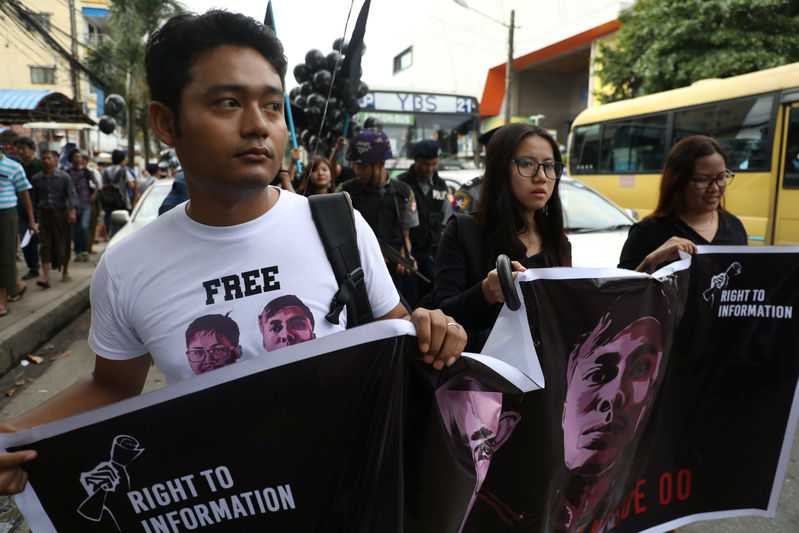Myanmar youth activists sour on Suu Kyi
04 December, 2018

Myanmar youth activist and television host Thinzar Shun Lei Yi would once have called herself one of Aung San Suu Kyi’s greatest fans. Now, she is one of her most vocal critics.
The 27-year-old belongs to a small but high-profile group of liberal activists, many former die-hard Suu Kyi supporters, who are growing increasingly disillusioned with the administration they voted into power with sky-high hopes three years ago.
“I lost my idol. I’m confused, frustrated and lost,” said Thinzar Shun Lei Yi, who hosts an “Under 30” talk show on a popular local website.
“Most of the activists and youths are now thinking: ‘What is next,’ ‘What will happen?’ ‘What can we do?’ At this stage, Daw Aung San Suu Kyi is going her own way and nobody can intervene, and she won’t listen to civil society organizations,” she said, using the honorific for women in Myanmar.
While Suu Kyi continues to inspire devotion among many ordinary people in Myanmar, the emergence of a dissenting youth movement — driven by anger over her handling of ethnic minorities, including the Muslim Rohingya, as well as curbs on the media and civil society — presents a new challenge for her administration.
At stake is the future of Myanmar’s transition towards democracy after years of military rule. With a general election looming in 2020, the country’s first civilian government in decades is confronted by growing divisions among activists who once coalesced around her National League for Democracy party.
NLD spokesman Myo Nyunt said the party was trying to win over young people, increasing the budget for education and supporting vocational training programs.
“The youth and the people expected a lot from our government,” he said. “We couldn’t live up to their expectations, we admit. But we are doing our best.”
Suu Kyi took power in 2016 after a landslide election win, vowing to continue democratic reforms and end the country’s long-running civil wars.
Since then, the administration has come under pressure over its response to a military crackdown against the Rohingya minority that the United Nations has described as “ethnic cleansing” with “genocidal intent,” as well as faltering peace talks with ethnic armed groups and a stagnating economy.
Free speech
Activists say the civilian government has also become increasingly authoritarian, failing to use its overwhelming parliamentary majority to scrap colonial-era laws used to stifle dissent, while tightening restrictions on civil society.
In recent months, they have staged several protests, including an antiwar march in the commercial capital of Yangon in May that ended in scuffles. A total of 17 people were charged with unlawful protest, including Thinzar Shun Lei Yi. Their trial is ongoing.
“Sensitive issues are banned, and protesters arrested and beaten,” she said. “The National League of Democracy, the party using the name of democracy, must respect democracy and human rights.”
According to free speech organization Athan, which means “Voice” in Burmese, 44 journalists and 142 activists have faced trial since the Suu Kyi government took power.
The group’s founder, poet and activist Maung Saung Kha, is one of them. He was also among the protesters charged alongside Thinzar Shun Lei Yi in May. Four months later, in September, they both helped organize another demonstration, this time for free speech.
Facing the crowd, Maung Saung Kha — who is still an NLD member — donned the orange shirt traditionally worn by his party’s lawmakers and draped a green jacket resembling military garb over it. Armed with a copy of the state-run daily newspaper The Mirror, he began beating journalists gathered nearby.
“The government has failed to use its power to protect people’s rights,” he told Reuters.
Myo Nyunt, the party spokesman, said the government was cooperating with nongovernmental organizations, but their activities needed to be examined case-by-case.
“If it is not related to security or not a divisive issue among ethnics, we accept them,” he said. “We are going forward to democracy so we acknowledge the role of NGOs, but we have concerns that NGOs are being influenced by sponsors instead of being independent.”
Sympathy for Rohingya
While she has no control over the military, Suu Kyi has faced international criticism for failing to defend the Rohingya, more than 730,000 of whom fled a sweeping army cracking in western Rakhine State in 2017, according to U.N. agencies. The crackdown was launched in response to insurgent Rohingya attacks on security forces.
Myanmar denies almost all the allegations of atrocities made by refugees, saying the army was carrying out a legitimate campaign against terrorists.
While many among Myanmar’s Buddhist majority revile the Rohingya, the young activists offer a rare sympathetic voice.
